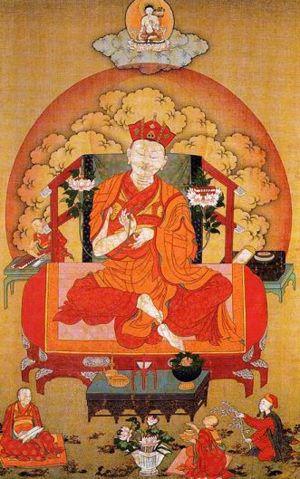Dergé Kangyur: Difference between revisions
Jump to navigation
Jump to search
No edit summary |
No edit summary |
||
| Line 9: | Line 9: | ||
==External Links== | ==External Links== | ||
*[http://tbrc.org/link?RID=W22084 Dergé Kangyur on TBRC] | *[http://tbrc.org/link?RID=W22084 Dergé Kangyur on TBRC] | ||
*{{84000|https://read.84000.co/translation/toh4568-3.html|The Third Well-Spoken Branch: An Exact Account of How All the Victorious One’s Teachings Extant Today in the Land of Snow Mountains Were Put into Print}} | |||
[[Category:Kangyur]] | [[Category:Kangyur]] | ||
[[Category:Dergé]] | [[Category:Dergé]] | ||
Latest revision as of 15:16, 1 April 2024

Dergé Kangyur (Tib. སྡེ་དགེ་བཀའ་འགྱུར་, Wyl. sde dge bka' 'gyur) was produced in 1733 at the Sakya Monastery in Dergé through the patronage of the ruler Tenpa Tsering (1678-1738) and under the careful direction of Situ Panchen Chökyi Jungné (1699/1700-1774). It contains 1,108 texts in 102 volumes, with the catalogue (karchak) of Situ Panchen added as volume 103. The cutting of the woodblocks lasted from 1729 to 1733. This edition was based primarily on the Lithang edition.
Further Reading
- Paul Harrison, 'A Brief History of the Tibetan bKa' 'gyur' in Cabezón and Jackson, ed., Tibetan Literature: Studies in Genre, Snow Lion, 1996
- E. Haarh, 'A comparative list of the Derge and Lhasa editions of the Kanjur', in Asia Minor NS 9 (1963), pp. 179-205
- Josef Kolmaš, Iconography of the Derge Kanjur and Tanjur, Orientální ústav (Československá akademie věd). Knihovna, 2002